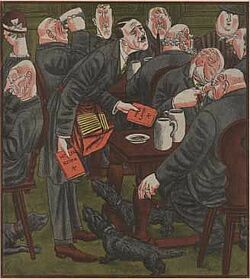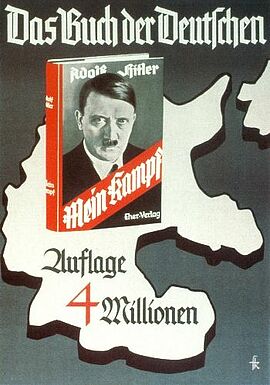after writing mein kampf adolf hitler went on to
Hitler, Mein Kampf. A Critical Edition

On 31 December 2015, 70 years after Hitler's death, the copyright will expire on his book Mein Kampf. Immediately after that expiration date, the Leibniz Institute for Contemporary History (IfZ) intends to present to the public an annotated critical edition of this work.
Central in critical commentary are the deconstruction and contextualisation of Hitler's book. How did his theses arise? What aims was he pursuing in writing Mein Kampf? What social support did Hitler's assertions have among his contemporaries? What consequences did his claims and asseverations have after 1933? And in particular: given the present state of knowledge, what can we counterpose to Hitler's innumerable assertions, lies and expressions of intent?
This is not only a task for historiography. In the view of the powerful symbolic value still attached to Hitler's book, the task of demystifying Mein Kampf is also a contribution to historical information and political education.
What is Mein Kampf?
Mein Kampf is Hitler's most important programmatic text. He composed it between 1924 and 1926 in two volumes. In a strongly stylized form, Volume 1 centres on Hitler's biography and the early history of the Nazi party (NSDAP) and its predecessor organization, the German Workers' Party (Deutsche Arbeiterpartei, DAP). Volume 2 mainly deals with the political programme of the National Socialists. Large sections of Volume 1 were written during Hitler's incarceration in Landsberg am Lech subsequent to his abortive coup attempt in November 1923. Its failure, his imprisonment and the prohibition of the NSDAP interrupted Hitler's political career. He utilised this time in order to weld everything that he had previously experienced, read and thought into an ideology in written form, and to develop a new perspective and strategy for his now outlawed party. After his release from prison, Hitler wrote much of the second volume at his mountain retreat in Obersalzberg. Once Hitler was installed as Reich Chancellor in January 1933, sales of the book skyrocketed, and it became a bestseller. Down to 1945, it was translated into 18 languages and 12 million copies were sold.
After Hitler's suicide and the collapse of the Nazi regime in 1945, the victorious Allied powers transferred the rights to Hitler's book to the Free State of Bavaria. The Bavarian state government then repeatedly employed the copyright in its possession to prevent any new printing of the work. But with the expiration of the copyright 70 years after Hitler's death, effective 1 January 2016, this legal instrument is no longer available.
Why a critical scholarly edition?
Mein Kampf is one of the central source documents of National Socialism. Writing in 1981, the historian Eberhard Jäckel stressed its importance and impact: 'Perhaps never in history did a ruler write down before he came to power what he was to do afterwards as precisely as Adolf Hitler. For that reason alone, the document deserves attention. Otherwise the early notes and accounts, speeches and books that Hitler wrote would at best be solely of biographical interest. It is only their translation into reality that raises them to the level of a historical source'.
Hitler's politics, the war and crimes he initiated, changed the world completely. It was for that reason that all extant texts he authored – his speeches, his early notes and observations, his conversations with diplomats, his 'monologues' in the Führer Headquarters, his instructions for the conduct of the war and finally likewise his last will and testament − were published long ago. By contrast, we still have no scholarly edited critical version of the most extensive of Hitler's writings, and also to a certain extent his most personal. Since the war's end, Mein Kampf has only been published in extracts in Germany – a gap that has long been considered a desideratum in research on National Socialism.
The aim of this edition is thus to present Mein Kampf as a salient source document for contemporary history, to describe the context of the genesis of Hitler's worldview, to reveal his predecessors in thought and mentality as well to contrast his ideas and assertions with the findings of modern research.
In preparing scholarly editions of National Socialist texts, the IfZ can point to a varied and wide-ranging expertise: for example, the collection of Hitlers Reden, Schriften, Anordnungen 1925-1933 (Hitler's Speeches, Writings and Directives, 1925-1933), published between 1991 and 1998/2003, encompasses 12 volumes. In 1961, the Institute for Contemporary History also published Hitler's Zweites Buch (Second Book). In the 1990s the Institute brought out the diaries of Joseph Goebbels and recently published the diaries of the NSDAP 'chief ideologue', Alfred Rosenberg. For that reason, it is only consistent if now the Institute also takes up this challenge of a critical edition of Mein Kampf, dealing with a textual source that certainly does not present itself like other historical documents. Rather, what is necessary, along with sober and precise scholarly expertise, is a critical encounter with Hitler's text, in sum: an edition with a point of view.
A contribution to political education
Preparing scientific commentary on Mein Kampf is not only a scholarly task. There is hardly any book that is more overladen with such a multitude of myths, that awakens such disgust and anxiety, that ignites curiosity and stirs speculation, while simultaneously exuding an aura of the mysterious and forbidden – a taboo that can prove for some commercially lucrative.
Consequently, this critical edition of Mein Kampf also views itself as a contribution to historical-political information and education. It seeks to thoroughly deconstruct Hitler's propaganda in a lasting manner and thus to undermine the still effective symbolic power of the book. In this way, it also makes it possible to counter an ideological-propagandistic and commercial misuse of Mein Kampf.
After all, despite all the debates about republication, Hitler's book has long been accessible in a variety of ways: on the shelves of used book shops, in legally printed English translation or a mouse click away on the Internet – Mein Kampf is out there and every year manages to find new readers, agitators and commercial profiteers.
For that reason as well, the task of a annotated critical edition is to render the debate objective and to put forward a serious alternative, a counter-text to the uncritical and unfiltered dissemination of Hitler's propaganda, lies, half-truths and vicious tirades. The scholarly edition prepared by the Institute for Contemporary History is oriented to political education, and thus consciously seeks in form and style to reach a broad readership. By means of a kind of 'framing' of the original text in the form of an introduction and detailed commentary, a subtext to Mein Kampf is constructed. Through these annotations, it quickly becomes clear how Hitler's ideology arose, just how selective and distorted his perception of reality was, and and it becomes possible to show the link between its formulation in Mein Kampf and the political practice and its terrible consequences after 1933.
How do the editors work?

Two historians, under the direction of Christian Hartmann, are currently at work in the IfZ on the critical edition of Mein Kampf. They are structuring the original text by providing explanatory introductions to each individual chapter; through more than 3,500 annotations, they address a broad spectrum of variegated tasks by providing:
- Objective information on persons and events described
- Clarification of central ideological concepts
- Disclosure of the source materials Hitler utilised
- Explanation of the roots of various concepts in the history of ideas
- Contextualisation of aspects contemporaneous to the text
- Correction of errors and one-sided accounts
- Development of a perspective on the consequences of Hitler's book
- New contributions in relevant fundamental research
Unusually in the context of an edition of a book, the editorial team is also examining the period after 1933, thus comparing Hitler's programmatic ideas with his political actions in the time period 1933-1945.
The core editorial team, which in the peak phase of its work on the edition consisted of five historians, is further supported by experts from a number of other scientific fields in order to better evaluate Hitler's myriad assertions in the light of the findings of modern research. To that end, external interdisciplinary advisors have also been consulted from a range of scholarly disciplines, including German Studies, human genetics, Japanology, Jewish Studies, art history, the educational sciences and economic history.
The team at the IfZ also encompasses special editorial staff for copy-editing and manuscript preparation, indexing and the precise textual comparison of seven select printings of Mein Kampf, along with a number of student assistants. Besides, the team is additionally able to benefit significantly from the broad professional infrastructure of the entire IfZ, with its many staff members specialized in research on the period of National Socialism, and its wealth of relevant library and archival resources.
In order to retain all areas of copyright, and also to counter possible commercial utilisation of this sensitive topic, Hitler, Mein Kampf – eine kritische Edition is to be self-published directly by the IfZ. The scheduled date of publication will be immediately after expiration of the original copyright in January 2016.
Current information on the debate regarding the publication of Mein Kampf can be found here:
Mein Kampf in public discussion
after writing mein kampf adolf hitler went on to
Source: https://www.ifz-muenchen.de/en/news/topics/hitler-mein-kampf-a-critical-edition
Posted by: salinasformselly97.blogspot.com

0 Response to "after writing mein kampf adolf hitler went on to"
Post a Comment